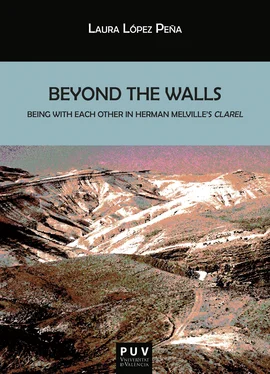Laura López Peña - Beyond the Walls.
Здесь есть возможность читать онлайн «Laura López Peña - Beyond the Walls.» — ознакомительный отрывок электронной книги совершенно бесплатно, а после прочтения отрывка купить полную версию. В некоторых случаях можно слушать аудио, скачать через торрент в формате fb2 и присутствует краткое содержание. Жанр: unrecognised, на английском языке. Описание произведения, (предисловие) а так же отзывы посетителей доступны на портале библиотеки ЛибКат.
- Название:Beyond the Walls.
- Автор:
- Жанр:
- Год:неизвестен
- ISBN:нет данных
- Рейтинг книги:3 / 5. Голосов: 1
-
Избранное:Добавить в избранное
- Отзывы:
-
Ваша оценка:
- 60
- 1
- 2
- 3
- 4
- 5
Beyond the Walls.: краткое содержание, описание и аннотация
Предлагаем к чтению аннотацию, описание, краткое содержание или предисловие (зависит от того, что написал сам автор книги «Beyond the Walls.»). Если вы не нашли необходимую информацию о книге — напишите в комментариях, мы постараемся отыскать её.
Beyond the Walls. — читать онлайн ознакомительный отрывок
Ниже представлен текст книги, разбитый по страницам. Система сохранения места последней прочитанной страницы, позволяет с удобством читать онлайн бесплатно книгу «Beyond the Walls.», без необходимости каждый раз заново искать на чём Вы остановились. Поставьте закладку, и сможете в любой момент перейти на страницу, на которой закончили чтение.
Интервал:
Закладка:
THE POLITICS OF INTERSUBJECTIVE UNIVERSALISM
Ernesto Laclau has theorized a plural and decentralized model of universalism which this study considers enabling to the creation of democratic politics due to its dialogic possibilities. Drawing from the possibilities opened up by poststructuralist theory, Laclau rejects an abstract and homogenizing Universal in order to vindicate that universalism is not in opposition to particularisms and that, therefore, none of these two tendencies should be exclusive of the other. As a matter of fact, Laclau’s conception of universalism gathers together particular struggles (now separate and even confronting and competing against each other), while preserving the particularity of these struggles:
The universal is incommensurable with the particular, but cannot, however, exist without the latter. How is this relation possible? My answer is that this paradox cannot be solved, but that its non-solution is the very precondition of democracy. The solution of the paradox would imply that a particular body had been found, which would be the true body of the universal. But in that case, the universal would have found its necessary location, and democracy would be impossible. If democracy is possible, it is because the universal has no necessary body and no necessary content; different groups, instead, compete between themselves to temporarily give to their particularisms a function of universal representation. ( Emancipation(s) 35)
Laclau’s model of universalism not only vindicates the inseparability of universalism and democracy, but goes as far as to claim that “the abandonment of universalism undermines the foundation of a democratic society” (122). The theorist’s view of universalism is based on a conception of the universal as an “absent fullness” (15), a missing totality that is each time anew, provisionally and temporarily, filled up by a specific particular which gets access to a position of “hegemony”. Revising the Gramscian concept of “hegemony” evoking notions such as rule, dominance, or competition, Laclau conceives hegemony as the process by which particulars temporarily inhabit the empty universal. This process consists of a pragmatic, collaborative, and dialogic practice by which not only are particulars given expression, but new meanings may be created when breaking through the barriers of each of these individual particulars. Universalism is, therefore, a “horizon” (“Universalism” 90) consisting of an empty space unifying multiple equivalential demands (56); it constitutes the process of temporarily inhabiting the defining emptiness of the universal. This process places particulars within a hegemonic relationship with other particulars, which, in turn, will themselves occupy the space of the empty signifier as well. According to Laclau, this empty signifier or universal is only possible because of its impossible totality, since, if it were constituted as totality, its “political grounding” would become “either a totalitarian closure or a pre-given unity […] waiting to be realized (Lott 666). This way, Nora Sternfeld explains, “[u]niversality is preserved as a dimension without any possibility of fulfillment by a particularism”. This vacancy facilitates politics, as multiple differences are placed within, and find their expression through, a relationship of equivalence by which each particular is as well split: “on the one hand, each difference expresses itself as difference; on the other hand, each of them cancels itself as such by entering into a relationship of equivalence with all the other differences in the system” ( Emancipation(s) 38). This process enables the construction of universalism by means of subverting the differential nature of particularisms and, at the same time, placing them within an equivalential logics in which both the logics of difference and of equivalence operate, and which allows for the realization—or, rather, the impossible realization—of the empty signifier and the universal (39). Linda Zerilli describes the universal articulated by Laclau as “the fragile, shifting, and always incomplete achievement of political action; it is not the container of a presence but the placeholder of an absence, not a substantive content but an empty place”; it is, in other words, a universalism which “is not One” (15):
The very fact that commonalities must be articulated through the interplay of diverse political struggles—rather than discovered and then merely followed, as one follows a rule—means, first, that no group or social actor can claim to represent the totality and, second, that there can be no fixing of the final meaning of universality (especially not through rationality). The universal cannot be fixed because it “does not have a concrete content of its own but is an always preceding horizon resulting from an indefinite expansion of equivalential demands. (11)
Laclau’s theory places particularisms within a system of equivalential relationships that allows them to occupy a universal function in connection with other particulars, which will occupy this universal function as well. Consequently, for Laclau, hegemony results not in an imposition but, rather on the contrary, in a constant negotiation of the relationship between the universal and the particular. In this sense, Zerilli connects Laclau’s conception of hegemony to Hannah Arendt’s notion of “critical judgment”:
What Laclau and Arendt share, despite their differences, is the view that intersubjective agreement is not there to be discovered in the universality of experience or the sameness of identity. There is nothing that we all share by virtue of being human or of living in a particular community that guarantees a common view of the world; there is nothing extralinguistic in the world that guarantees that we all share a common experience; there is no Archimedean place from which we could accede to a universal standpoint. But if Laclau (like Arendt) refutes the false universality of abstract rationality or common identity, he by no means rejects universalism “as an old-fashioned totalitarian dream” (26). Playing a different language game with the universal, however, Laclau […] reinterprets universality as a site of multiple significations which concern not the singular truths of classical philosophy but the irreducibly plural standpoints of democratic politics. Even those who want nothing to do with this or any universal, says Laclau, can never quite escape the pull of its orbit. (8)
In short, universalism is not an essence but a political process that stems from the dialogic encounter of different particulars. Nevertheless, in spite of the democratic possibilities it opens, Laclau’s articulation of universalism is not without its loose ends. For example, Linda Zerilli has pointed out that the concept of the empty signifier may be misleading to a certain extent, since “it is not always clear what the place of the particular is, finally, in the empty signifier. Is this particular overcome, left behind, transformed? Is the empty signifier, strictly speaking, empty?” (14). As a matter of fact, Laclau does claim that the universal is empty; that it cannot be predicted in advance, because it needs to be the result of the hegemonic operation that enables different particulars to temporarily occupy the place of the universal and negotiate this place with other particulars which they are united to by their relationship of equivalence. In addition, the equivalential relationship process does not authorize all worldviews or particulars as equally valid. Zerilli notes how it is indeed a delicate matter to provide an answer to the question of why “not all claims to the universal are equally authorized; why the claims of some groups to represent the whole carry more cultural weight than those of other groups” (14), without seeming to fall into the paradox of restricting the very democracy and plural universalism we claim to give expression to. And, nonetheless, it is obvious that certain individuals and communities built upon racist, sexist, homophobic, cultural supremacist, imperialist, colonialist, even genocidal agendas, in the name of racial/religious “purity” or even of nationalism and the nation, must be rejected in the process of universalism, since these agendas attempt against the plurality of the very humanity which universalism is expressive of and by which it is constructed. Crucial to give an answer to this question are the arguments on ethics by thinkers such as Hannah Arendt, Zygmunt Bauman, Judith Butler, and Emmanuel Levinas analyzed earlier. As has been argued, these thinkers vindicate the need of developing ethical interpersonal relationships based on an understanding of the common vulnerability of human beings, the respect for the plurality of humanity, and the mutual interconnection and responsibility of human beings for one another, close and distant. In the same way that the particular and the universal are inseparable in the construction of democratic politics, politics and ethics are also inseparable in the construction of universalism. If we believe with Levinas that morality is innate to human beings, then, we have no reason for renouncing our obligations to others. The fact that, as Melville repeatedly analyzed and lamented in his oeuvre, innate depravity—combined with well-interiorized inter-human walls—may obscure or even entirely neutralize the task of developing intersubjective universalism out of segregationism and individualism, is not in itself an excuse to abandon the project. Rather on the contrary, it constitutes an added proof of its urgency.
Читать дальшеИнтервал:
Закладка:
Похожие книги на «Beyond the Walls.»
Представляем Вашему вниманию похожие книги на «Beyond the Walls.» списком для выбора. Мы отобрали схожую по названию и смыслу литературу в надежде предоставить читателям больше вариантов отыскать новые, интересные, ещё непрочитанные произведения.
Обсуждение, отзывы о книге «Beyond the Walls.» и просто собственные мнения читателей. Оставьте ваши комментарии, напишите, что Вы думаете о произведении, его смысле или главных героях. Укажите что конкретно понравилось, а что нет, и почему Вы так считаете.










